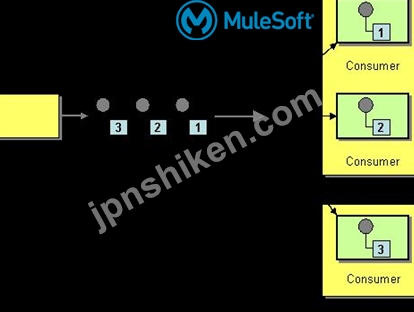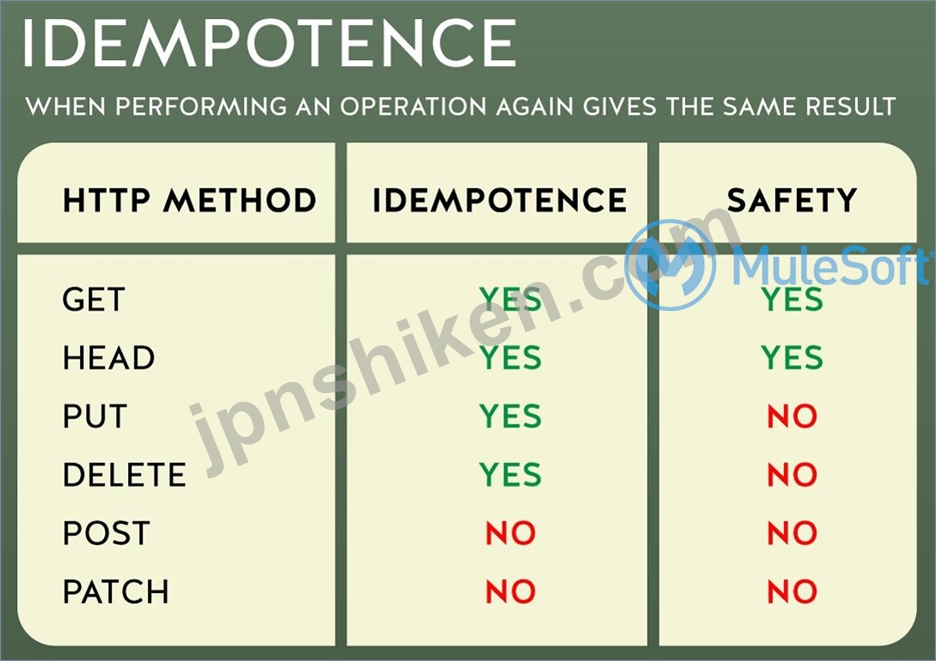- ホーム
- MuleSoft
- MCIA-Level-1-JPN - MuleSoft Certified Integration Architect - Level 1 (MCIA-Level-1日本語版)
- MuleSoft.MCIA-Level-1-JPN.v2023-08-02.q116
- 質問92
有効的なMCIA-Level-1-JPN問題集はJPNTest.com提供され、MCIA-Level-1-JPN試験に合格することに役に立ちます!JPNTest.comは今最新MCIA-Level-1-JPN試験問題集を提供します。JPNTest.com MCIA-Level-1-JPN試験問題集はもう更新されました。ここでMCIA-Level-1-JPN問題集のテストエンジンを手に入れます。
MCIA-Level-1-JPN問題集最新版のアクセス
「275問、30% ディスカウント、特別な割引コード:JPNshiken」
展示を参照してください。

Mule アプリケーションは、マルチノード Mule ランタイム クラスタにデプロイされます。Mule アプリケーションは、クラスタ レプリカ間で競合するコンシューマ パターンを使用して、JMS キューから JMS メッセージを受信します。受信した各 JMS メッセージを処理するために、次の手順がフローで実行されます。
ステップ l: JMS 相関 ID ヘッダーは、受信した JMS メッセージから読み取られます。
ステップ 2: Mule アプリケーションは、HTTPS を介してべき等 SOAP Web サービスを呼び出し、JMS 相関 ID を SOAP 要求の 1 つのパラメータとして渡します。
ステップ 3: SOAP Web サービスからの応答も、同じ JMS 相関 ID を返します。
ステップ 4: SOAP Web サービスから受け取った JMS 相関 ID は、ステップ 1 で受け取った JMS 相関 ID と同一であることが検証されます。
ステップ 5: Mule アプリケーションは応答 JMS メッセージを作成し、JMS 相関 ID メッセージ ヘッダーを検証済みの JMS 相関 ID に設定し、そのメッセージを応答 JMS キューにパブリッシュします。
Mule アプリケーションは、ステップ 1 とステップ 3 で受け取った JMS 相関 ID 値をどこに保存する必要がありますか? これにより、ステップ 4 の検証を実行できると同時に、Mule アプリケーション全体の可用性、フォールト トレラント、パフォーマンス、保守性を高めることができますか?

Mule アプリケーションは、マルチノード Mule ランタイム クラスタにデプロイされます。Mule アプリケーションは、クラスタ レプリカ間で競合するコンシューマ パターンを使用して、JMS キューから JMS メッセージを受信します。受信した各 JMS メッセージを処理するために、次の手順がフローで実行されます。
ステップ l: JMS 相関 ID ヘッダーは、受信した JMS メッセージから読み取られます。
ステップ 2: Mule アプリケーションは、HTTPS を介してべき等 SOAP Web サービスを呼び出し、JMS 相関 ID を SOAP 要求の 1 つのパラメータとして渡します。
ステップ 3: SOAP Web サービスからの応答も、同じ JMS 相関 ID を返します。
ステップ 4: SOAP Web サービスから受け取った JMS 相関 ID は、ステップ 1 で受け取った JMS 相関 ID と同一であることが検証されます。
ステップ 5: Mule アプリケーションは応答 JMS メッセージを作成し、JMS 相関 ID メッセージ ヘッダーを検証済みの JMS 相関 ID に設定し、そのメッセージを応答 JMS キューにパブリッシュします。
Mule アプリケーションは、ステップ 1 とステップ 3 で受け取った JMS 相関 ID 値をどこに保存する必要がありますか? これにより、ステップ 4 の検証を実行できると同時に、Mule アプリケーション全体の可用性、フォールト トレラント、パフォーマンス、保守性を高めることができますか?
正解:C
* If we store Correlation id value in step 1 as Mule event variables/attributes, the values will be cleared after server restart and we want system to be fault tolerant.
* The Correlation ID value in Step 1 should be stored in a persistent object store.
* We don't need to store Correlation ID value in Step 3 to persistent object store. We can store it but as we also need to make application performant. We can avoid this step of accessing persistent object store.
* Accessing persistent object stores slow down the performance as persistent object stores are by default stored in shared file systems.
* As the SOAP service is idempotent in nature. In case of any failures , using this Correlation ID saved in first step we can make call to SOAP service and validate the Correlation ID.
Top of Form
Additional Information:
* Competing Consumers are multiple consumers that are all created to receive messages from a single Point-to-Point Channel. When the channel delivers a message, any of the consumers could potentially receive it. The messaging system's implementation determines which consumer actually receives the message, but in effect the consumers compete with each other to be the receiver. Once a consumer receives a message, it can delegate to the rest of its application to help process the message.

* In case you are unaware about term idempotent re is more info:
Idempotent operations means their result will always same no matter how many times these operations are invoked.

Bottom of Form
* The Correlation ID value in Step 1 should be stored in a persistent object store.
* We don't need to store Correlation ID value in Step 3 to persistent object store. We can store it but as we also need to make application performant. We can avoid this step of accessing persistent object store.
* Accessing persistent object stores slow down the performance as persistent object stores are by default stored in shared file systems.
* As the SOAP service is idempotent in nature. In case of any failures , using this Correlation ID saved in first step we can make call to SOAP service and validate the Correlation ID.
Top of Form
Additional Information:
* Competing Consumers are multiple consumers that are all created to receive messages from a single Point-to-Point Channel. When the channel delivers a message, any of the consumers could potentially receive it. The messaging system's implementation determines which consumer actually receives the message, but in effect the consumers compete with each other to be the receiver. Once a consumer receives a message, it can delegate to the rest of its application to help process the message.

* In case you are unaware about term idempotent re is more info:
Idempotent operations means their result will always same no matter how many times these operations are invoked.

Bottom of Form
- 質問一覧「116問」
- 質問1 MuleSoft によると、IT デリバリを完了するために、IT 組織はテ...
- 質問2 展示を参照してください。 (Exhibit) Mule 4 アプリケーションに...
- 質問3 組織は、サーバル データベース操作と他のいくつかのコネクタと
- 質問4 2 つのクラスター レプリカを持つランタイム ファブリック環境に...
- 質問5 VM を使用する Mule アプリケーションが顧客がホストするクラス...
- 質問6 着信 JMS メッセージを listen する JMS コネクターを含む XA ト...
- 質問7 Mule アプリケーションが JMS コネクタを使用して JMS プロバイ...
- 質問8 企業は、さまざまなクラウドハブ ワーカーにさまざまなパブリッ
- 質問9 API 実装を構築する前に、MuleSoft 開発者が API 仕様を作成する...
- 質問10 Mule アプリケーションは、APIkit for SOAP を使用して SOAP Web...
- 質問11 プラットフォーム アーキテクトには、通信管理用の分散アプリケ
- 質問12 保険会社は、MuleSoft Hosted ランタイム プレーンに Mule アプ...
- 質問13 MuteSoft 統合チームが配信品質を向上させるために採用すべき主...
- 質問14 Mule アプリケーションでは、フローには 2 つの JMS 消費操作が...
- 質問15 展示を参照してください。 (Exhibit) ショッピング カートのチェ...
- 質問16 Mule アプリケーションは、組織のネットワーク内の顧客がホスト...
- 質問17 Mule Domain Project について正しくないのはどれですか?...
- 質問18 HTTP リスナーのキー ストアとトラスト ストアの両方を構成する...
- 質問19 組織は、販売注文レコードを含む新しいファイルの SFTP ロケーシ...
- 質問20 MuleSoft の IT デリバリおよび運用モデルによると、IT プロジェ...
- 質問21 展示を参照してください。 Mule アプリケーションは、SOAP Web ...
- 質問22 組織は、パフォーマンス プロファイルを持つ 8 ノート クラスタ...
- 質問23 Mule アプリケーションには、2 つのバッチ ステップ (Batch_Step...
- 質問24 組織は、Mulesoft がホストするコントロール プレーンを使用して...
- 質問25 組織は、すべての Mule アプリケーションを Runtime Fabric (RTF...
- 質問26 Mule アプリケーションは、1 つのデータベースに対する一連の操...
- 質問27 展示を参照してください。 (Exhibit) ビジネス プロセスには、SF...
- 質問28 組織のガバナンス プロセスでは、プロジェクト チームはすべての...
- 質問29 拡張アーキテクチャー (XA) トランザクションで受信メッセージを...
- 質問30 展示を参照してください。 (Exhibit) Mule アプリケーションには...
- 質問31 コネクタ、テンプレート、API 仕様など、Anypoint Exchange にコ...
- 質問32 展示を参照してください。 (Exhibit) Mule アプリケーションは、...
- 質問33 パフォーマンスを向上させるために、顧客がホストする既存の Mul...
- 質問34 MuleSoft が推奨する REST 規則によると、AP\ クライアントが指...
- 質問35 ある小売業者は、そのサプライヤーが使用するデータ交換インター
- 質問36 プロジェクト チームは、RAML 仕様を使用して API の機能要件を...
- 質問37 エンタープライズ アーキテクトとして、Mulesoft Anypoint プラ...
- 質問38 プロセス API に適用される可能性が最も低い API ポリシーはどれ...
- 質問39 自動車会社は、キュー Q1 および Q2 を介してディーラー D1 およ...
- 質問40 Mule アプリケーションは、顧客がホストする 2 つの Mule ランタ...
- 質問41 組織は、モバイル アプリと Web アプリケーションの両方から顧客...
- 質問42 展示を参照してください。 (Exhibit) 組織は、2 ノードの Mute ...
- 質問43 組織は、エンタープライズ ソフトウェア システムの調達に注意を...
- 質問44 頻繁なプラグイン バージョンのアップグレードと外部プラグイン ...
- 質問45 ある企業がアプリケーション ネットワークを構築しており、4 つ...
- 質問46 組織は現在、データセンター内でマルチノード Mule ランタイム展...
- 質問47 IT が、ビジネスに必要な変化のペースに追いつくのに十分な長さ...
- 質問48 プラットフォーム コントロール プレーンに属する Anypoint プラ...
- 質問49 組織は、顧客がホストする 2 つの Mule ランタイムを使用してク...
- 質問50 API 認証に API キーのみを使用する場合よりも、OAuth 2.0 クラ...
- 質問51 組織は、今日の見積もりをキャッシュする Quote of the Day API ...
- 質問52 IT 統合デリバリ チームは、すべての要件を収集することからプロ...
- 質問53 米国国立標準技術研究所 (NIST) によると、データとアプリケーシ...
- 質問54 チームは、アプリケーション ネットワーク用のシステム API を実...
- 質問55 現在、外部 Web UI アプリケーションは、在庫システムのデータベ...
- 質問56 金融大手は、すべての Mule アプリケーションをランタイム ファ...
- 質問57 エグゼクティブ リーダーシップとの計画セッション中に、開発チ
- 質問58 ある製造会社は、Mule アプリケーションを自社の Azure Kubernet...
- 質問59 ある組織は、顧客がホストする 4 つのノードの Mule ランタイム ...
- 質問60 プロセス API の実装は変更する必要があります。API クライアン...
- 質問61 組織には、HTTP POST 経由で JSON データを受け入れるいくつかの...
- 質問62 組織は、さまざまなサーバーをホストする独自の AWS VPC を以前...
- 質問63 cloudhub にデプロイされた Mule アプリケーション muleA は、Ob...
- 質問64 Mule アプリケーションが設計されています SFTP を介して外部ベ...
- 質問65 組織は、API 主導の接続と他の統合アプローチのどちらかを選択し...
- 質問66 ある製造会社は、Mule アプリケーションを自社の Azure Kubernet...
- 質問67 あるマーケティング組織が、キャンペーン データを処理する Mule...
- 質問68 Mule アプリケーションで有効化された JMX エージェントを介して...
- 質問69 ABC 社は、顧客がホストする独自の AWS インフラストラクチャに...
- 質問70 MuleSoft によると、マイクロサービス アプリケーション アーキ...
- 質問71 Anypoint Analytics を使用して、カスタム チャートで視覚化する...
- 質問72 API クライアント、API 実装、および API インターフェイス コン...
- 質問73 Mule アプリケーションは、Customer Hosted Runtime にデプロイ...
- 質問74 Anypoint Platform では、企業はさまざまな基幹業務 (LOB) に対...
- 質問75 ある会社は、Mule API をヨーロッパ地域に拡張することを計画し...
- 質問76 大手 e コマース企業は、Mulesoft API のオン ランタイム ファブ...
- 質問77 CloudHub にデプロイされたアプリケーションに割り当てることが...
- 質問78 開発中の新しい Mule アプリケーションは、広範なデータ変換ロジ...
- 質問79 顧客がホストする Mule ランタイムにデプロイされた Mule アプリ...
- 質問80 DevOps チームは、個々のシステムの動作とパフォーマンスを十分...
- 質問81 Kubernetes コントローラーは、アプリケーションの負荷の増加に...
- 質問82 組織には、すべてのミュール アプリケーションに、フローごとに
- 質問83 Clondhub で公開された SOAP VI.2 API に、ルール制限ポリシーが...
- 質問84 大きな XML ペイロードをストリームとして読み取る統合 Mule 4 ...
- 質問85 展示を参照してください。 (Exhibit) 組織は、組織のオンプレミ...
- 質問86 大量の e コマース小売業者は、1 時間あたり数千の注文を受け取...
- 質問87 典型的な MuleSoft 統合プロジェクトの一部として API 実装の構...
- 質問88 プロジェクト チームは、RAML 定義を出発点として使用して API ...
- 質問89 MuleSoft によると、2 つのシステム間の通信に使用される方法、...
- 質問90 銀行会社は、オンライン ビジネス用の新しい API セットを開発し...
- 質問91 独自の Anypoint Platform ビジネス グループを持つさまざまな事...
- 質問92 展示を参照してください。 (Exhibit) Mule アプリケーションは、...
- 質問93 新しいビジネス プロセスを可能にするために、一連の統合 Mule ...
- 質問94 MuleSoft によると、Center for Enablement (C4E) が企業とその...
- 質問95 HTTP リクエストを介して本番データベースからデータを公開する...
- 質問96 機械設備に予知保全を実装するために、ACME Tractors は何千もの...
- 質問97 ある組織が、REST API を実装する Mule アプリケーションを開発...
- 質問98 製品のオーケストレーションを実行するために、ミュール アプリ
- 質問99 統合チームは Anypoint Platform を使用し、MuleSoft が推奨する...
- 質問100 組織は、Mulesoft がホストするコントロール プレーンを使用して...
- 質問101 統合開発者が再利用可能な API、コネクタ、およびテンプレートを...
- 質問102 組織には、Process Orders という名前の別の Mule アプリケーシ...
- 質問103 IT 統合トラムは、API 主導の接続アプローチに従って、注文処理...
- 質問104 証券会社は、CloudHub VPC を利用して Mule アプリケーションを...
- 質問105 展示を参照してください。 (Exhibit) HTTP リスナーとロガーは、...
- 質問106 AP の実装と管理の両方で、Anypoint Platform が持つ生産性の利...
- 質問107 Anypoint Platform では、企業は複数の事業部門 (LOB) に対して...
- 質問108 組織は、CloudHub 共有ロード バランサー (SLB) を使用するか、C...
- 質問109 顧客は、マッピングされた診断コンテキスト (MDC) とログ変数を...
- 質問110 展示を参照してください。 (Exhibit) Anypoint Platform は、プ...
- 質問111 Mule アプリケーションは、単一の CloudHub ワーカーへのデプロ...
- 質問112 組織は、CloudHub 共有ロード バランサー (SLB) を使用するか、C...
- 質問113 組織は、統合と API プラットフォームに Mulesoft を選択しまし...
- 質問114 Mule アプリケーションは、1 つのデータベースに対する一連の操...
- 質問115 組織は、m-unit を使用してアプリケーションのテスト スイートを...
- 質問116 Order マイクロサービスと Fulfillment マイクロサービスは、メ...

[×]
Download PDF File
Enter your email address to download MuleSoft.MCIA-Level-1-JPN.v2023-08-02.q116.pdf
